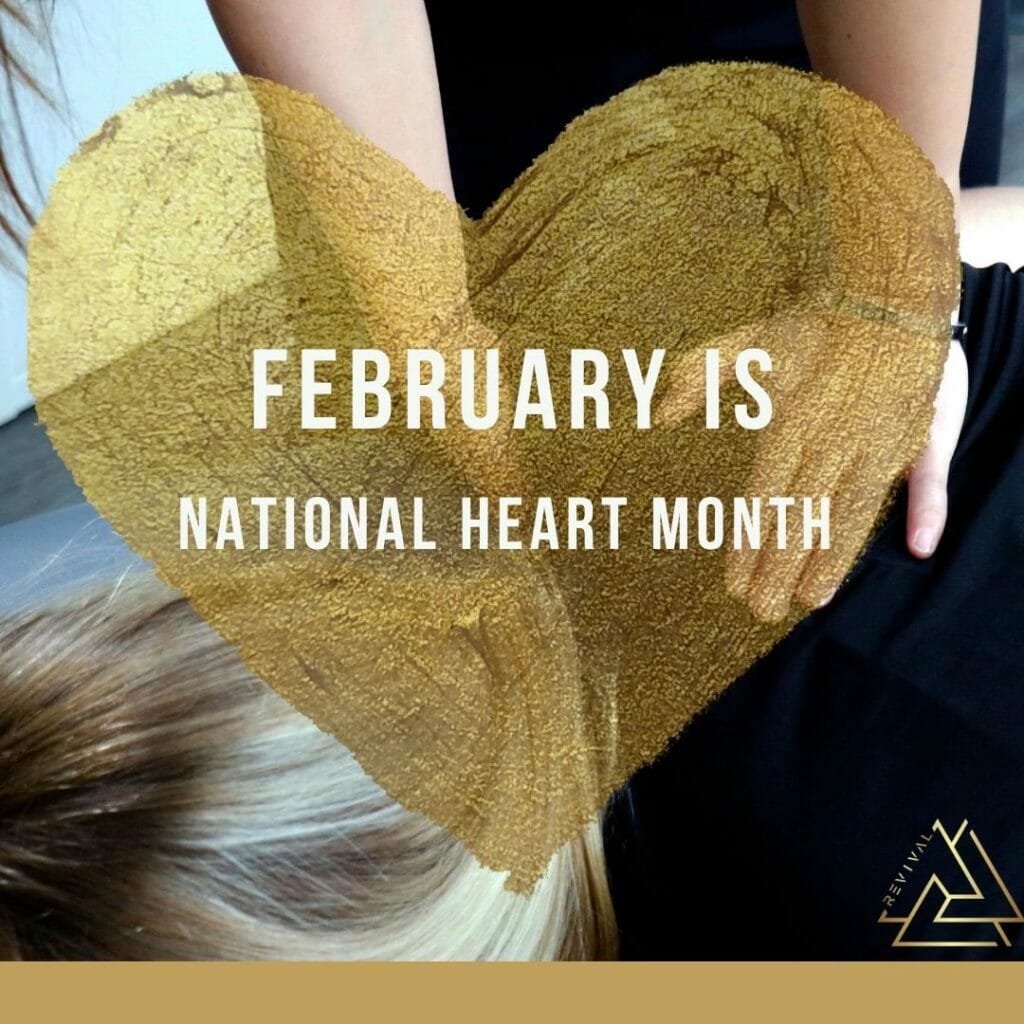
February is heart month and with that, we are reminded that cardiovascular disease (CVD) has become the leading cause of premature mortality worldwide. (4) However with that being said, there are many ways to lower our risks of CVD. The earlier we take control of our health, the better in the long run.
The most prevalent risk factors leading to CVD include hypertension, diabetes, systemic inflammation, dyslipidemia which is an improper balance in lipids, including cholesterol, low-density lipoprotein (LDL), triglycerides and high-density lipoprotein (HDL) and smoking (9).
MANUAL THERAPY BENEFITS FOR HEART HEALTH
While diet and regular exercise are extremely important factors in reducing blood pressure, blood glucose and lipids, manual therapy as well as proper supplementation have been shown to add a plethora of benefits in improving our cardiovascular health.
At Revival, our therapists use a variety of techniques such as Fascial Stretch Therapy, Visceral Manipulation, Craniosacral Therapy, RAPID Neurofascial reset, cupping, and IASTM to get you moving better and feeling your best. By restoring proper movement patterns in the body, manual therapy can help to reduce muscle tension, stiffness and pain. Additionally, when joints and muscles move properly and without pain, it may encourage an individual to engage in physical activity, therefore, improving cardiovascular fitness, lowering blood pressure, and improving cholesterol levels.
Several studies have also shown that reducing overall systemic inflammation has a positive correlation with decreasing atherosclerotic plaque and lowering CVD risk as inflammatory cells cause vascular oxidative stress (8). Manual therapy techniques can help to increase blood flow to the body’s tissues by relaxing muscles and releasing tension in the soft tissues. This can improve the delivery of oxygen and nutrients to the body’s cells, which can help to promote healing and reduce inflammation (2).

Manual therapy(Hands on therapy), such as that with Athletic Therapy and Massage therapy have also been shown to reduce stress and tension in the muscles and that has been linked to an overall lowering of blood pressure (2). Massage Therapy has also been shown to improve heart rate variability, which is a robust measure of how our bodies can adapt to stress (10). Lastly, manual therapy can also help to improve lymphatic flow, which is important for removing waste and toxins from the body. This can help to reduce inflammation and promote overall health (1). Some of our therapists use specialized techniques to optimize lymphatic drainage.
STUDIED SUPPLEMENTATION FOR HEART HEALTH

Having a healthy, balanced diet should always be a priority when looking to optimize your health and lower your risk of CVD . Supplements can be used as a tool to further optimize an already well rounded nutrition plan.
OMEGA 3s
Omega-3 fatty acids comprised of docosahexaenoic acid (DHA) as well as purified eicosapentaenoic acid (EPA) have been documented in numerous studies to show overall triglyceride and blood pressure reduction, anti-inflammatory and anti arrhythmic effects. (3) Higher dosage and refining quality of the oil are big factors in how well Omega 3s are delivered to the body. Around 4000 mg of DHA and EPA combined from supplementation have been found to be most beneficial in preventing CVD. (3) The Genestra Super DHA Forte Liquid offers 2800 mg of total Omega 3 fatty acids comprising both DHA and EPA per teaspoon (5ml) serving so two teaspoons would offer even more than the studied 4000 mg. Generstra Super EFA Forte Liquid plus Vitamin D offers 2600 mg per 5 ml, so once again two teaspoons would be sufficient to provide this studied beneficial dose. The Genestra Super EFA Forte Liquid also offers 1000 IU of Vitamin D per teaspoon so at the proper dosage, it would offer a total of 2000 IU of Vitamin D which is always beneficial as an estimated 30-50% of the population across all ages and ethnicities have a Vitamin D deficiency. (9)
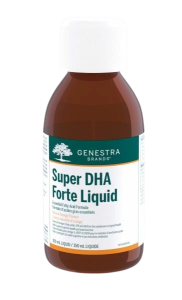
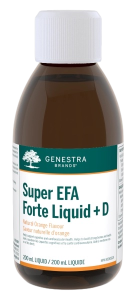
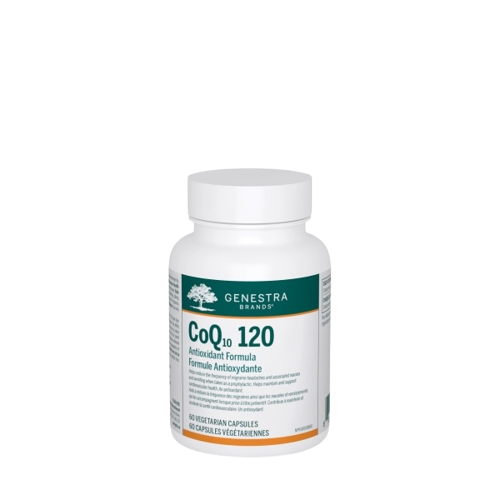
CoQ10
CoQ10 is a very well-studied and documented antioxidant that has been shown to play a crucial part in mitochondrial cellular energy production and several studies have pointed out that people who develop CVD have lower-than-usual levels of CoQ10. (7) 200-400 mg was the recommended studied dosage that offered the most benefits both prophylactically as well as post-diagnosis with CVD (7). Genestra CoQ10 120 offers 120 mg per capsule making it possible to take up to 3 capsules per day.
MAGNESIUM
Magnesium is an essential mineral that is important for proper muscle function. A diet high in magnesium with at least (500-1000 mg/day) has been shown to lower blood pressure because Magnesium acts as a calcium channel blocker, inhibiting Sodium from binding to the cellular receptor and causing a vasodilatory effect. (8) It is worth it to note that Magnesium in combination with potassium and low sodium intake is most effective long-term in blood pressure reduction. (8) Magnesium Glycinate is a form of Magnesium that is bioavailable but in comparison to its counterpart, Magnesium Citrate, Magnesium Glycinate is easier on the digestion and stomach, making it a better choice especially at larger dosages to avoid GI upset. Pure Encapsulations Magnesium Glycinate offers 120 mg of elemental Magnesium per capsule making it an excellent choice of Magnesium.
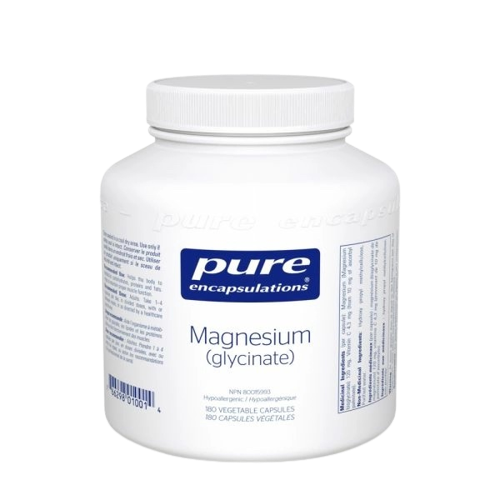
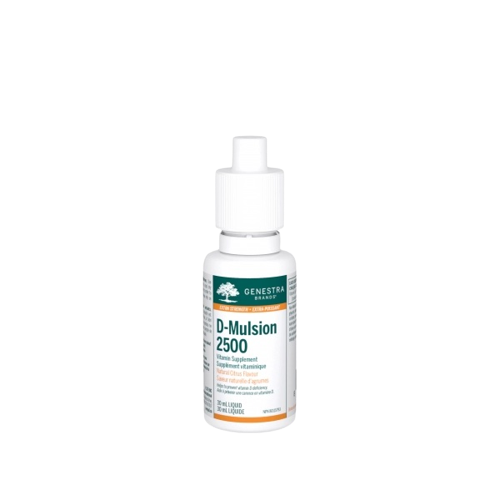
VITAMIN D
Vitamin D is a fat-soluble vitamin that plays an important role in many cellular signalling pathways but generally it is mostly known for its role in bone mineralization and intestinal calcium absorption. (9) However studies have linked vitamin D deficiency to an increased risk of hypertension, atherosclerosis and heart failure. (9) Although the science 4000-5000 IU daily of Vitamin D has been the studied dosage that showed a beneficial correlation with improved outcomes (10) Genestra’s D-Mulsion 2500 IU offers the proper dosage of Vitamin D in two small drops that taste great and can be taken on the go but of note is to accompany vitamin D intake with a fat component in your meal so that it can get properly absorbed in the GI tract.
When looking to improve your heart health it is important to look at the body as a whole. Test and do not guess! Reach out to your health care provider if you have any concerns and ensure the appropriate testing is completed.
Disclaimer:
This article does not constitute as medication advice. Supplementation and manual therapy should not be considered as a substitute for traditional medical care and it is always recommended to consult with a healthcare professional before making any changes, especially if you have any underlying health conditions or are taking any medications.
References:
- Bigeh, Allison; Sanchez, Alexandra; Maestas, Camila; Gulati, Martha; (2020) “Inflammatory bowel disease and the risk for cardiovascular disease: Does all inflammation lead to heart disease?”, Trends in Cardiovascular Medicine, Vol 8. Issue 30, pp. 463-469
- Cabanas-Valdés, R; Calvo-Sanz, J; Serra-Llobet, P; Alcoba-Kait, J; González-Rueda, V; Rodríguez-Rubio, P.R; (2021) “ The Effectiveness of Massage Therapy for Improving Sequelae in Post-Stroke Survivors. A Systematic Review and Meta-Analysis”. Int. J. Environ. Res. Public Health Vol. 18, pp. 4424
- Cosentino, N; Campodonico, J; Milazzo, V; De Metrio, M, Brambilla M, Camera M, Marenzi G. (2021) “Vitamin D and Cardiovascular Disease: Current Evidence and Future Perspectives”, Nutrients. Vol. 13, No.10, pp. 3603
- Di Lorenzo, A; Iannuzzo, G; Parlato, A; Cuomo, G; Testa, C; Coppola, M; D’Ambrosio, G; Oliviero, DA; Sarullo, S; Vitale, G; Nugara, C; Sarullo, FM; Giallauria, F; (2020) “Clinical Evidence for Q10 Coenzyme Supplementation in Heart Failure: From Energetics to Functional Improvement”, Journal of Clinical Med Vol. 9 No. 5, pp. 1266.
- Elagizi, Andrew; Lavie, Carl; O’ Keffe, Evan; Marshall, Keri; O’Keffe, James; Milani, Richard; (2021) “An Update on Omega 3 Polyunsaturated Fatty Acids and Cardiovascular Health”, Nutrients, Vol. 13, pp. 204
- Houston, Mark (2011) “The Role of Magnesium in Hypertension and Cardiovascular Disease”, Journal of Clinical Hypertension, Vol. 13, No. 11, pp. 834-847
- Latic, N; Erben, RG; (2020) “Vitamin D and Cardiovascular Disease, with Emphasis on Hypertension, Atherosclerosis, and Heart Failure” Int J Mol Sci. Vol. 21 No. 18, pp. 6483.
- Steven, Sebastian; Frenis, Katie; Oelze, Matthias; Kalinovic, Sanela; Kuntic, Marin; Jimenze, Maria Terasa Bayo; Vyjacic-Mirkski, Ksenja; Helmstadter, Johanna; Kroller-Schon, Swenja; Munzel, Thomas; Daiber, Andreas; (2019) “Vascular Inflammation and Oxidative Stress: Major Triggers for Cardiovascular Disease”, Oxidative Medicine and Cellular Longevity
- Teo, Koon; Rafiq, Talha (2021) “Cardiovascular Risk Factors and Prevention: A Perspective From Developing Countries”, The Canadian Journal of Cardiology, Vol. 5, Issue 37, pp. 733-743
- Veerbeek, JM; vanWegen, Evan; Peppen, R; lVanderWees, P; Hendriks, E; (2014) ”What Is the Evidence for Physical Therapy Post Stroke? A Systematic Review and Meta-Analysis”, PLoSONE. Vol. 2, Issue 9
